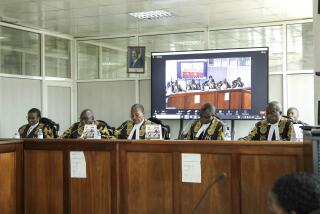State Court Rules Jurors Can’t Be Excluded for Sexual Orientation
Expanding protections for homosexuals in jury service, a state appeals court ruled Tuesday that gays and lesbians cannot be excluded from participating on juries solely because of their sexual orientation.
The unanimous decision, the first in the nation by an appeals court on the issue of gays and the jury selection process, states that homosexuals should be afforded the same shield against discriminatory actions inside the courtroom as other minority groups.
Legal experts and government officials said the ruling is likely to have far-reaching implications and could result in new scrutiny of other cases where gays may have been barred because of their sexual orientation.
The 4th Appellate District Court’s decision stems from a case in which two Orange County women were dismissed from a jury panel by the prosecutor in a robbery case after revealing that they belonged to a lesbian organization.
The defendant was convicted, but his lawyers claimed on appeal that the case was tainted because the prosecutor kept the two women off the jury.
The justices ordered a new hearing on that case to determine if the women were dismissed solely because of their sexual orientation. If so, they ordered that the defendant, a convicted third-strike offender serving a life sentence for burglary, should be given a new trial.
To exclude homosexuals from a jury, the justices wrote, would be to deny a defendant’s right to be heard by a jury that represents a cross-section of the community. Homosexuals qualify as a “cognizable” group in society because, like ethnic groups, they share a common perspective arising from their life experiences, the justices ruled.
“It cannot be argued in this era of ‘don’t ask, don’t tell’ that homosexuals do not have a common perspective--a common social or psychological outlook on human events--based upon their membership in that community,” wrote Justice William W. Bedsworth. “They share a history of persecution comparable to that blacks and women share.”
The state attorney general’s office argued against a new hearing on the matter, saying that gays were too diverse a group to share a common outlook to be specially protected by the court. “What common perspective is, or was, shared by . . . RuPaul, . . . Truman Capote, and Ellen DeGeneres?” argued state prosecutors.
But the court rejected that argument, saying that gays “deserve to bear their share of the burdens and benefits of citizenship, including jury service.” Bedsworth also acknowledged the court was breaking new ground with its ruling: “The landscape before us is as stark as a moonscape and without visible footprints.”
The attorney general’s office has yet to decide whether to appeal to the state Supreme Court. Officials said if the ruling stands, it will have a significant impact on the courts, giving rise to a slew of new appeals.
“This is the first time that any court in the country has defined gays and lesbians as a cognizable group,” said Nathan Barankin, a spokesman for the state attorney general’s office. “It could create procedural problems and new grounds for appeals for persons who have been rightly convicted in court.”
Experts said the decision cements the state’s record as a leader on gay and lesbian rights issues, and could have strong national repercussions.
“I think this is a very significant decision and likely to be influential nationally,” said Craig Christensen, a law professor at Southwestern University School of Law. “It expressly includes now the notion that sexual orientation is enough of an identifying characteristic so that gays can’t be systematically excluded from a jury,”
Added Erwin Chemerinsky, a USC law professor: “This is an issue that will come up throughout the country, and this decision could have a national effect in terms of influencing the development of the law.”
The Orange County district attorney’s office declined to comment on the decision and would not explain why the two jurors were excused in the case. Tori Richards, a spokeswoman for the district attorney’s office, said they believed the conviction was sound. “We believe that the jury was adequate and they reached a fair verdict,” she said.
More to Read
Sign up for Essential California
The most important California stories and recommendations in your inbox every morning.
You may occasionally receive promotional content from the Los Angeles Times.











